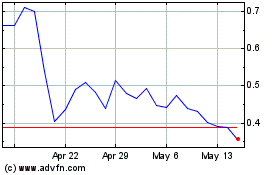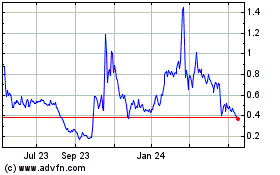Manuscript Published on Multiorgan Failure Patients Treated with SeaStar Medical’s Selective Cytopheretic Device Who Achieved Transplant Eligibility
May 22 2024 - 8:30AM

SeaStar Medical Holding Corporation (Nasdaq: ICU), a
commercial-stage medical device company developing proprietary
solutions to reduce the consequences of hyperinflammation on vital
organs, announces the publication of a manuscript citing four case
studies in which critically ill patients between the ages of 22
months and 71 years with multiorgan failure who were treated with
the Selective Cytopheretic Device (SCD) successfully stabilized and
improved their clinical status prior to stem cell or liver
transplant, or left ventricular assist device implantation. The
abstract was published in peer-reviewed Transplantation Direct,
which is available here.
Titled “Increasing Eligibility to Transplant
Through the Selective Cytopheretic Device (SCD): A Review of Case
Reports Across Multiple Clinical Conditions,” the manuscript by S.
Iyer, C. Pino, L. Yessayan, S. Goldstein, M. Weir, A. Westover, D.
Catanzaro, K. Chung and H.D. Humes notes that a stable, minimum
physiological health status is required for patients to qualify for
transplant or artificial organ to ensure the recipient has
sufficient reserve to survive the perioperative transplant period.
Excessive systemic inflammation or hyperinflammation can prevent
the body from returning to immune homeostasis and toward organ
recovery, potentially delaying or prohibiting a needed
transplantation. The SCD is an extracorporeal device that is
designed to abate hyperinflammation by selectively targeting and
transitioning proinflammatory monocytes to a reparative state
regardless of the underlying clinical conditions.
“SCD therapeutic treatment was used to reduce
the consequences of excessive inflammation in these four patients
with different etiologies yet all with high levels of organ
dysfunction. In each case, the SCD was able to improve the
patient’s clinical status or extend the duration of improvement
prior to transplantation,” said Sai P. Iyer, PhD, SeaStar Medical
Vice President, Medical Affairs and Clinical Development. “The SCD
was well tolerated, with no serious device-related adverse events,
infections or signs of immuno-depletion observed in any patient.
Although these are initial pilot cases, the favorable results form
the basis for further investigation in additional clinical
studies.”
“We continue to collect data demonstrating the
versatility of SCD therapy in patients with multiple organ failures
and across multiple indications,” said Eric Schrolff, SeaStar
Medical CEO. “We are securing breakthrough device designation in
multiple indications, followed by small clinical studies, some
conducted under grants, and publishing the resulting data in
peer-reviewed journals. This clinical development strategy is
expected to pave the way for market approvals for a therapeutic
device that we believe can improve the quality of life for severely
ill patients and help save lives.”
To date, the U.S. Food and Drug Administration
(FDA) has granted the SCD Breakthrough Device Designation for
adults with acute kidney injury, cardiorenal syndrome and
hepatorenal syndrome.
About Hyperinflammation
Hyperinflammation is the overproduction or
overactivity of inflammatory cells that can lead to damage of vital
organs. It occurs when the body overproduces inflammatory effector
cells and other molecules that can be toxic, damaging to vital
organs and result in multi-organ failure and even death. This is
known as the cytokine storm.
About the Selective Cytopheretic Device
(SCD)
The SCD is a patented cell-directed
extracorporeal device that employs immunomodulating technology to
selectively target proinflammatory neutrophils and monocytes during
continuous kidney renal therapy (CKRT) and reduces the
hyperinflammatory milieu including the cytokine storm that causes
inflammation, organ failure and possible death in critically ill
patients. Unlike pathogen removal and other blood-purification
tools, the device is integrated with CKRT hemofiltration systems to
selectively target and transition proinflammatory monocytes to a
reparative state and promote activated neutrophils to be less
inflammatory. Quelimmune selectively targets the most highly
activated proinflammatory neutrophils and monocytes. These cells
are then returned back into the body through the blood, and the
body is signaled to lower its inflammatory environment and focus on
repair. This unique immunomodulation approach may promote long-term
organ recovery and eliminate the need for future KRT, including
dialysis.
About SeaStar Medical
SeaStar Medical is a commercial-stage medical
technology company that is redefining how extracorporeal therapies
may reduce the consequences of excessive inflammation on vital
organs. SeaStar Medical’s novel technologies rely on science and
innovation to provide life-saving solutions to critically ill
patients. The Company is developing and commercializing
cell-directed extracorporeal therapies that target the effector
cells that drive systemic inflammation, causing direct tissue
damage and secreting a range of pro-inflammatory cytokines that
initiate and propagate imbalanced immune responses. For more
information visit www.seastarmedical.com or visit us on LinkedIn or
X.
Forward-Looking Statements
This press release contains certain
forward-looking statements within the meaning of the “safe harbor”
provisions of the Private Securities Litigation Reform Act of 1955.
These forward-looking statements include, without limitation, the
SCD’s ability to treat hyperinflammation and the expected results
of clinical trials and studies. Words such as “believe,” “project,”
“expect,” “anticipate,” “estimate,” “intend,” “strategy,” “future,”
“opportunity,” “plan,” “may,” “should,” “will,” “would,” “will be,”
“will continue,” “will likely result,” and similar expressions are
intended to identify such forward-looking statements.
Forward-looking statements are predictions, projections and other
statements about future events that are based on current
expectations and assumptions and, as a result, are subject to
significant risks and uncertainties that could cause the actual
results to differ materially from the expected results. Most of
these factors are outside SeaStar Medical’s control and are
difficult to predict. Factors that may cause actual future events
to differ materially from the expected results include, but are not
limited to: (i) the risk that SeaStar Medical may not be able to
obtain regulatory approval of its SCD product candidates; (ii) the
risk that SeaStar Medical may not be able to raise sufficient
capital to fund its operations, including clinical trials; (iii)
the risk that SeaStar Medical and its current and future
collaborators are unable to successfully develop and commercialize
its products or services, or experience significant delays in doing
so, including failure to achieve approval of its products by
applicable federal and state regulators, (iv) the risk that SeaStar
Medical may never achieve or sustain profitability; (v) the risk
that SeaStar Medical may not be able to access funding under
existing agreements; (vi) the risk that third-parties suppliers and
manufacturers are not able to fully and timely meet their
obligations, (vii) the risk of product liability or regulatory
lawsuits or proceedings relating to SeaStar Medical’s products and
services, (viii) the risk that SeaStar Medical is unable to secure
or protect its intellectual property, and (ix) other risks and
uncertainties indicated from time to time in SeaStar Medical’s
Annual Report on Form 10-K, including those under the “Risk
Factors” section therein and in SeaStar Medical’s other filings
with the SEC. The foregoing list of factors is not exhaustive.
Forward-looking statements speak only as of the date they are made.
Readers are cautioned not to put undue reliance on forward-looking
statements, and SeaStar Medical assumes no obligation and do not
intend to update or revise these forward-looking statements,
whether as a result of new information, future events, or
otherwise.
Contact:
LHA Investor Relations Jody Cain (310)
691-7100 Jcain@lhai.com
# # #
SeaStar Medical (NASDAQ:ICU)
Historical Stock Chart
From Dec 2024 to Jan 2025

SeaStar Medical (NASDAQ:ICU)
Historical Stock Chart
From Jan 2024 to Jan 2025
